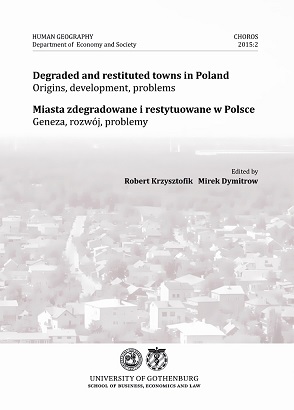- Hem
- Aktuellt
- Hitta nyheter
- New book about degraded towns in Poland
New book about degraded towns in Poland
New book about degraded towns in Poland
Degraded and restituted towns in Poland - origins, development and problems - edited by Robert Krzysztofik and Mirek Dymitrow

While ‘rural’ and ‘urban’ are conceptual binaries that certainly need to be treated with caution, their cultural salience may cause tangible consequences within national administrative systems that still use a formalized rural-urban distinction. This issue becomes particularly important for settlements that clearly transcend any imagined rural-urban divide, i.e. those, whose material and immaterial characteristics seem contrary to their assigned category. To this group belong so-called degraded and restituted towns.
Robert Krzysztofik’s and Mirek Dymitrow’s new transdisciplinary anthology “Degraded and restituted towns in Poland: origins, development and problems” offers a comprehensive guide to the little known phenomenon of degraded and restituted towns by, for the first time, compiling different research perspectives on the subject into a coherent whole. Espousing such a summative approach, the editors hope to bring more clarity to the topic, not least by engaging in general conceptual discussions on the elusiveness and purposefulness of the rural-urban dichotomy in our society.
The book contains chapters written by 17 authors representing 13 affiliations, mainly Polish: René Brauer, Marta Chmielewska, Norbert Dąbkowski, Ewa Dawidejt-Drobek, Weronika Dragan, Wiesław Drobek, Mirek Dymitrow, Iwona Kantor-Pietraga, Barbara Konecka-Szydłowska, Robert Krzysztofik, Jolanta Pełka-Gościniak, Elżbieta Przesmycka, Dariusz Sokołowski, Tomasz Spórna, Robert Szmytkie, Maria Thiel and Hanka Zaniewska.
Funded by the Geographical Association in Gothenburg (Geografiska Föreningen i Göteborg) and published at the Department of Economy and Society (Human Geography), this book also signals the importance of knowledge exchange across different countries and academic traditions – including the often overlooked Eastern European perspectives.
“The 17 chapters of this highly original book were written by scholars representing various international research centers, who, fascinated by the large group of towns of such intricate histories, made degraded and restituted towns objects of their scientific inquiry. The vast scope of this book, the empirical material and the thorough analyses of processes that determined the destinies of the deliberated towns all deserve the presumption that this book will become a very important scholarly work for everyone interested in the problems of urbanization. The editors’ initiative to summarize existing research and set out prospective directions is timely and commendable.” Professor Barbara Lubicz-Miszewska